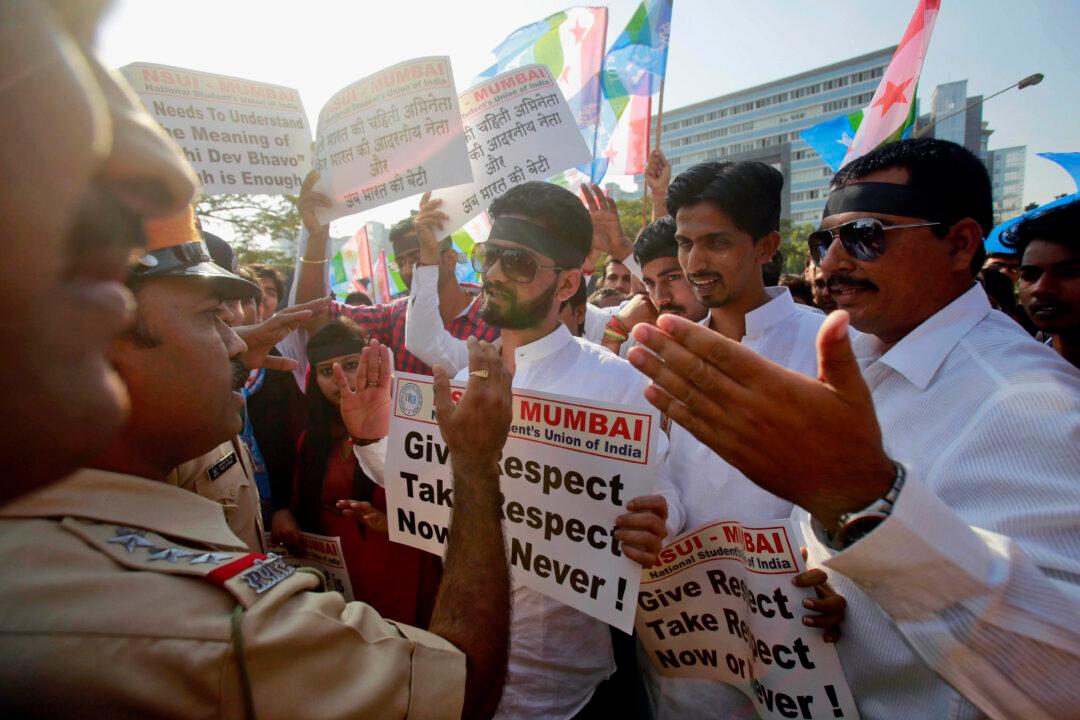While India and the United States struggle to break through the unsettled diplomatic row over the arrest of an Indian diplomat in New York, Indians are angry over the politicization of the issue and the high-handedness of the U.S.
What has upset Indians is the way the lady diplomat was treated; people were emotionally stirred when reports of her being strip-searched were published. The Indian government has asked the U.S. to drop all charges against her and to apologize on the matter, but on Friday, the U.S. State Department ruled out dropping the case.
Devyani Khobragade, India’s deputy consul-general in New York, was arrested by the U.S. marshals for VISA fraud and allegedly paying her maid, Sangeeta Richard, less than what was mentioned in maid’s employment visa. The U.S. marshals reportedly arrested and handcuffed Khobragade in public, outside her children’s school.
The issue became more complicated as Preet Bharara, an India-born U.S. attorney, justified the action taken against Khobragade, and blamed India for trying to silence Richard’s family and compelling them to return to India.
However, former Indian Diplomat and Strategic Affairs Expert K.C. Singh described the incidence as having made complicated by the U.S. “It’s got complicated as the U.S. upped the ante multiple levels by getting silly Bharara involved in it. Pressure and persistence needed,” he said. Later the U.S. distanced itself from Bharara’s comments. While according to media reports, the Indian Ministry of External Affairs strongly countered Bharara’s statement accusing him of interfering in Indian legal system.
Khobragade’s ill-treatment aroused retaliatory actions by the Indian government, leading to down-step many privileges given to the U.S. diplomats and their families in India that include withdrawing airport passes and stopping import clearances.
On Friday, some protesters in Mumbai city ransacked a Domino Pizza outlet calling for a ban of the U.S. products in the country. The reactions from various political parties have also been intense in lieu of the next year’s national elections. A report in New Delhi Television (NDTV) said politicians including two from the main parties refused to meet a delegation of US-lawmakers. One political party even offered a candidature seat to Khobragade for elections to the lower house of Indian parliament.
Bibhu Prasad Routray, a Singapore based security analyst and former deputy director at India’s National Security Council Secretariat said, “The issue has become political in nature with every party trying to garner mileage out of this. Initially of course it started as an IFS (Indian Foreign Service) issue, with the lobby trying to protect one of their colleagues. Now, the issue is being used for a different purpose, in view of the 2014 elections.”
However, India’s youth, seems neither impressed by the U.S. nor India’s response, but rather see it as an indicative of the double standards of Indian politicians.
Bitopi Dutta, a research associate at North Eastern Social Research Centre in Guwahati, said that it’s “an elite class argument who think they have the right to exploit the poor and not even penalized for that. So many violations on women have happened against women and working class here in India, those go unnoticed, but a bureaucrat being arrested on that shakes that ego, arrogance of the elite class.”
While Saurabh Sinha, 26, a New Delhi based development activist, wonders why the inhuman violence meted out to “others” doesn’t bother the political class. “Why is the ‘diplomatic row’ and media frenzy only active when one of their own ilks are ‘outraged’? Why are the inhuman violence meted out to ‘others’ do not awaken the human sentiments of the political class? Why can’t the diplomat’s treatment of her ’employee' (be) a concern?” he said.
Sinha thinks that the issue has been deliberately blown out of proportion and believes that “the outrage on something like this still highlights the concerns of the majority—with respect to elite concerns and useless muscle-flexing.”
“To make a martyr out of a person, [who is] sufficiently rich and powerful, over something like this is only to harp on some reality, which totally ignores the one at the ground,” he added.





